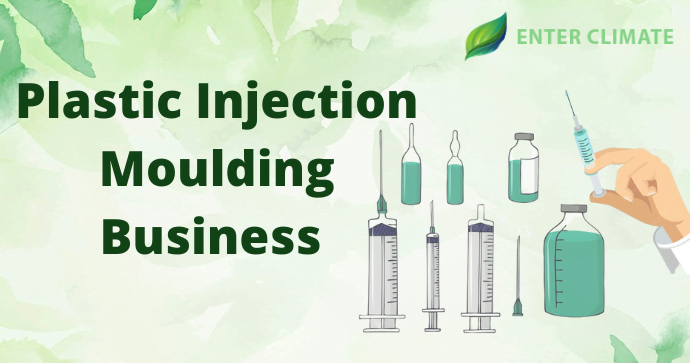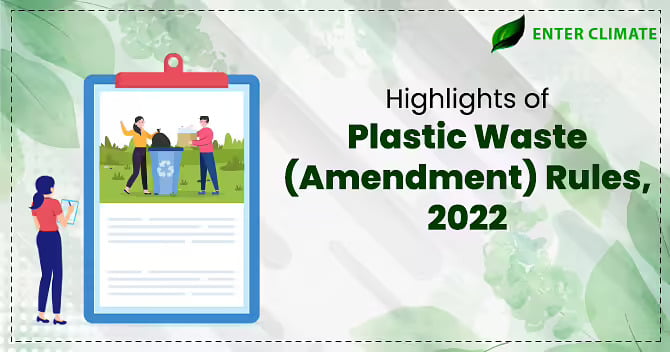EPR Customs Notification, w.r.t EPR on Plastic Packaging of Imported items
 05 Sep, 2023
05 Sep, 2023 
As per the EPR Customs Notification, importers, whether they are importing plastic packaging or other items, like for example, machinery or textiles packed in plastic packaging, are required to obtain EPR certification. The government has addressed various contentious issues in this notification, including who needs to apply for EPR certification and the process for releasing items that are held due to the absence of EPR certification from such importers. As per Rule 6 of Schedule II of the Plastic Waste Management (Amendment) Rules, 2022, individuals or entities importing plastic packaging products, products with plastic packaging, carry bags, multilayered packaging, plastic sheets, or similar items must register on the centralized portal developed by the Central Pollution Control Board. Failure to do so will result in importers being barred from conducting any business activities.
What are the new amended rules under the Plastic Waste Management Rules, 2022?
The Plastic Waste Management Rules of 2016 have undergone an update through the Plastic Waste Management (Amendment) Rules of 2022, which introduced the EPR Customs notification. These changes have expanded the responsibilities of producers, importers, and brand owners to include both pre-consumer and post-consumer plastic packaging waste. As defined in Rule 3(f) and outlined in Rule 6 of Schedule II of the Plastic Waste Management (Amendment) Rules of 2022, individuals or entities involved in importing plastic packaging products, including items like plastic packaging, carry bags, multilayered packaging, plastic sheets, and similar items, are now required to register on a centralized portal developed by the Central Pollution Control Board. Non-compliance restricts importers from conducting business activities.
It is evident that, apart from importers of plastic packaging, those importing various items like primary products, chemicals, machinery, textiles, and other articles that come wrapped or packed in plastic packaging are also obligated to undergo the Extended Producer Responsibility (EPR) registration process. However, it’s been noted that obtaining this registration can take up to 3-4 months, and during this period, the clearance of imported shipments cannot be delayed. This delay can disrupt supply chains and lead to longer customs clearance times.
To facilitate trade and minimize the stay period of the withheld items, the following procedure has been implemented for the expedited clearance which is explained in the EPR Customs notification as follows:
- Importers of goods that are not plastic packaging but are packaged in plastic, such as machinery or textiles, must upload their EPR registration on the e-Sanchit platform when filing their Bills of Entry. This step is essential to prevent any queries regarding EPR registration.
- In cases where EPR registration is not available at the time of filing the Bill of Entry, even though the importer has applied for it on the CPCB portal, the importer must upload the application status on e-Sanchit. Customs authorities will not hold the goods, and the consignment will be released. The officer in charge of releasing the consignment will maintain a record of such cases, which is outlined in the attached format of this Standing Order. This record will help monitor whether the importer eventually obtains EPR registration or not.
- All officers responsible for releasing consignments without EPR registration shall compile a list of such cases every month and submit it to the Deputy Commissioner (Appraising Main) Section by the 5th of the following month. Based on this list, the Deputy Commissioner (Appraising Main) will forward the complete list of consignments cleared by JNCH in the previous month, where EPR registration was not available at the time of clearance, but the application had been submitted on the CPCB portal. This reporting should be completed by the 20th of every month.
This procedure aims to balance the need for EPR registration compliance with the efficient flow of trade and the prevention of unnecessary delays in customs clearance.
Advantages of obtaining EPR certification
The policy explained in the EPR Customs notification offers several advantages, which have encouraged organizations to embrace this approach. Some noteworthy benefits include:
- Economic Gain from EPR Certification: Traditionally, the costs related to waste management were typically shouldered by municipal authorities. As the volume of waste disposal increased, there was a growing need for new waste disposal facilities. However, with the implementation of EPR, waste management companies receive support, and businesses are motivated to incorporate plastic waste into their production processes. This mutually beneficial arrangement eliminates the need for significant spending on managing discarded plastic and reduces the necessity for manufacturing entirely new plastic products. Ultimately, recycling proves to be a financially savvy move.
- Environmental Advantages: One of the primary objectives behind introducing EPR was environmental protection. Plastic waste has been identified as one of the most detrimental materials that end up in landfills. Over time, the proliferation of plastic products, which are convenient for transportation and disposal after use, has exacerbated this problem. As environmental concerns grew, governments began seeking alternatives. EPR-driven initiatives have led to the creation of recyclable plastic products that can be efficiently recycled after their use. Additionally, EPR contributes to reduced energy consumption, as recycling plastics consumes less energy than manufacturing new plastic items from scratch. This results in decreased air and water pollution. Furthermore, as urban areas expand and available land for infrastructure development diminishes, it becomes imperative to limit the use of landfills, which can have detrimental health effects on nearby communities.
- Social Benefits: EPR initiatives also yield social benefits, as businesses that actively recycle and reclaim plastic waste tend to enjoy favourable public perception. By becoming socially responsible brands, these companies can foster stronger relationships with their customers. As consumers become increasingly environmentally conscious, they are more inclined to purchase eco-friendly products. Businesses compliant with EPR promote their recycling efforts, which enhances the perception of their brands. Given the long-term advantages of such initiatives, an increasing number of producers are adopting EPR as a strategic direction.
What will be the consequences for failure to obtain EPR Certification?
Failure to obtain Extended Producer Responsibility (EPR) Certification can lead to several significant consequences for businesses and individuals involved in the import of items, especially those with plastic packaging. Some of the key results or consequences of not acquiring an EPR Certification by importers as required in the EPR Customs notification include:
- Legal Consequences: Non-compliance with EPR regulations can result in legal action, fines, and penalties imposed by environmental authorities. This can lead to costly legal battles and damage to a company’s reputation.
- Business Disruption: Importers who do not have EPR Certification may face disruptions in their business operations. They may not be able to clear customs, leading to delays in shipments and potential loss of revenue.
- Reputation Damage: Failing to obtain EPR Certification can harm a company’s reputation, especially in today’s environmentally conscious market. Consumers may view non-compliant businesses as irresponsible and environmentally unfriendly.
- Financial Consequences: Importers may incur additional costs related to waste management and compliance if they do not have EPR Certification. This includes expenses for proper disposal and recycling of materials.
- Market Access Restrictions: In some regions, EPR Certification may be a prerequisite for accessing certain markets. Failing to obtain certification can limit an importer’s market reach and opportunities.
- Environmental Impact: Without EPR Certification, there may be a lack of responsible waste management practices, potentially leading to increased environmental pollution and degradation.
- Supply Chain Disruption: Businesses relying on imported goods may experience supply chain disruptions if their suppliers do not have EPR Certification. This can lead to delays, increased costs, and potential loss of customers.
- Long-Term Sustainability: Failure to comply with EPR regulations can hinder an organization’s long-term sustainability goals, as it may not be effectively contributing to responsible waste management and resource conservation.
Required Documents for Obtaining EPR Certification
To obtain an Extended Producer Responsibility (EPR) certificate in India, you will be required to furnish the following documentation:
- Proof of Address
- Legal documentation for Manufacturers/Exporters
- Certificate of Incorporation
- IE Code (Importer Exporter Code)
- Documentation from the Directorate of Industries
- Certification from Municipal Corporations or Local Bodies (if applicable)
- Contact Information
- PAN Card Copy
- Information and documents for the authorized signatory (Aadhar Card)
- Product details, encompassing model numbers and import history
- Copy of a BIS License (if relevant)
- Information regarding RoHS compliance (Reduction of Hazardous Wastes)
- Details about the recycling entity
- Plans for E-Waste Management Estimation
- Budget Estimates for Electronic Producer Responsibility
- Strategy for public awareness regarding E-Waste management
- EPR Blueprint
- Copies of Agreements with the following parties:
- Collection Centers
- Dealers
- Recyclers
- Storage Facilities
- Disposal Facilities
- Website content outlining your commitment to E-Waste management
What is the process of obtaining the EPR License in India?
To obtain an EPR certificate, follow these steps:
- Assess Registration Requirements: Familiarize yourself with the prerequisites for the EPR pollution certificate by reviewing the EPR certificate format.
- Compile Documents: Gather and prepare all the necessary documentation as outlined in the previous section.
- Submit EPR Application: Complete the online EPR certificate application and submit it along with the required documents. Ensure that you also include the EPR certificate fee. The online EPR registration form will request detailed information, so it is advisable to have an expert available for assistance.
- Application Assessment by CPCB: Wait for the Central Pollution Control Board [1](CPCB) to review your EPR registration application. If any issues or discrepancies arise, they will be addressed and rectified.
- Receive Authorization Letter: Upon successful processing of your EPR pollution certificate application and payment of the required fees, you will receive the EPR certificate or the authorization letter for E-Waste Management.
- Compliance After Registration: Regardless of whether you are a manufacturer, involved in E-Waste Management, or seeking EPR registration for import purposes about the EPR Customs notification, the process remains the same. Once you have obtained the EPR certificate, you must handle plastic waste responsibly. The Extended Producer Responsibility guidelines stipulate that plastic cannot be disposed of easily recycling is the preferred and often the only viable option.
Renewal of EPR
The EPR license needs to be renewed every five years by submitting Form 1 within 60 days after the current registration expires. To renew, you will require the following documents: a certification from the State Pollution Control Board, Pollution Control Committees, or any other recognized agency confirming the appropriate management and disposal of hazardous wastes, as well as adherence to effluent and emission standards.
Conclusion
The EPR Customs notification discussed above highlights the critical role of Extended Producer Responsibility (EPR) in regulating the import of items, including those with plastic packaging. This notification underscores the government’s commitment to environmental sustainability and responsible waste management. Mandating EPR certification for importers and establishing a centralized registration portal, encourages compliance with stringent environmental standards. Failure to adhere to these regulations can have significant implications, including the inability to engage in business activities. Ultimately, this notification reinforces the importance of proactive measures in reducing environmental impact and promoting responsible import practices. It is recommended for importers to consult experts for obtaining the EPR Certification as per the EPR Customs notification so that they can guide you with the exact criteria and documents that will be required in the process.
Read our Article:Complete Overview Of EPR Policy In India













